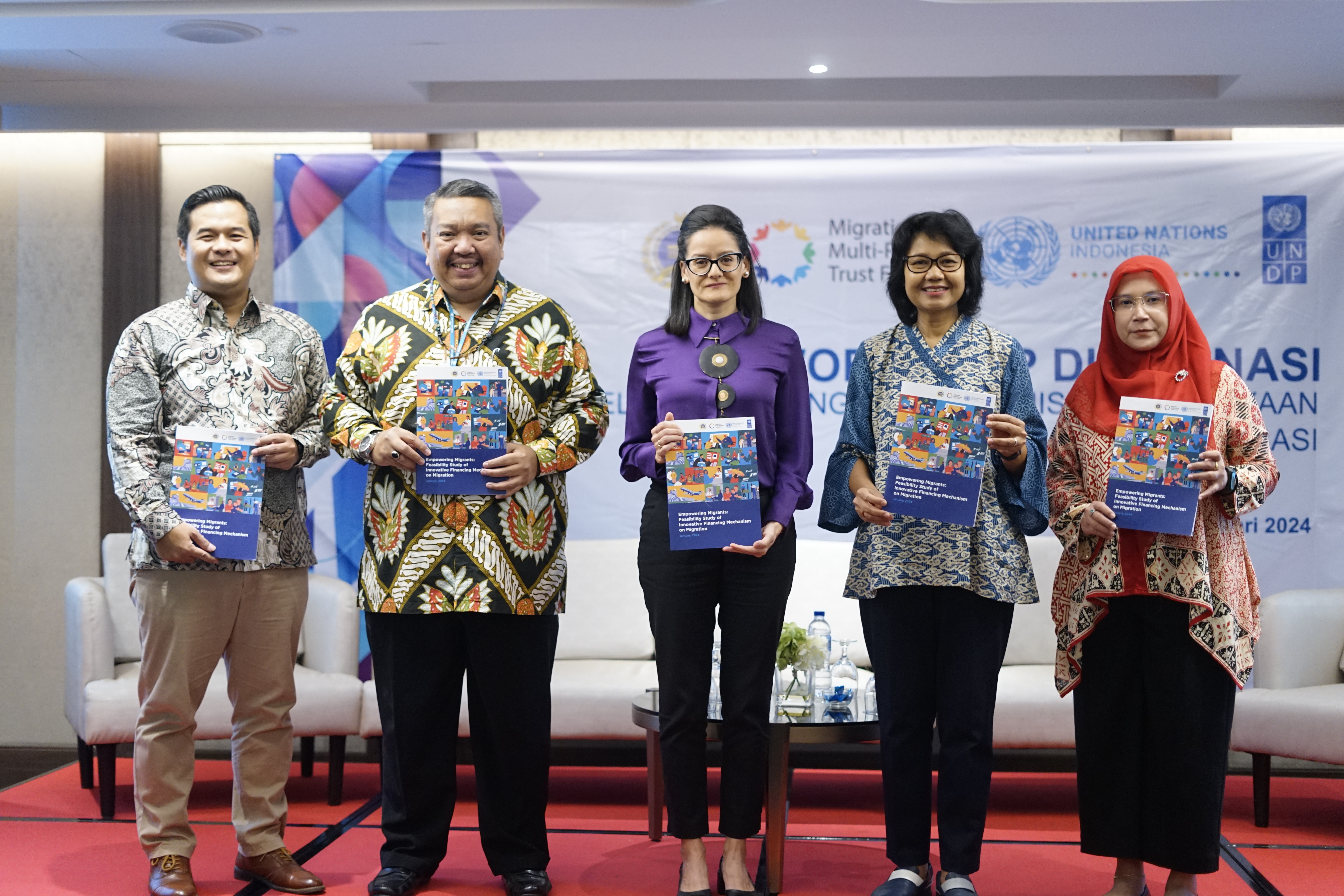UNDP and MoFA launched a study on Innovative Labour Migration Financing, a recommendation to Empower Indonesian Migrant Workers
February 13, 2024

Jakarta, 13 February 2024 – United Nations Development Programme (UNDP) Indonesia and the Ministry of Foreign Affairs (MoFA) launched a study entitled Empowering Migrant Workers: Feasibility Study of Innovative Financing Mechanism on Labour Migration. This study aims to provide a strategic entry point for formulating inclusive and beneficial policies for all relevant stakeholders, with the objective of empowering Indonesian migrant workers.
The study highlights two factors underscoring the significance of innovative financing mechanisms aligned with national and local development. Firstly, it addresses the limited financial resources to support migration expenses. Secondly, it explores the reasons for insufficient financial literacy and planning among most migrant workers and their households.
The ultimate objective of this study is to present the feasible recommendations for innovative financing mechanisms for labour migration at all stages of migration—before, during, and after. In addition, the study aims to give the insights to Indonesian Government to enable them to protect migrant workers effectively through various formal financing mechanism from diverse sources. The study presents five innovative financing mechanisms, namely: (1) people’s business specifically designed for migrant workers; (2) a mechanism to manage remittances effectively, (3) ways to invest in productive assets, (4) approaches to building a Village-Driven Multi-Stakeholder Cooperative, and (5) initiatives based on Corporate Social Responsibility from private sector to support migrants and their households.
According to the Migrant Workers Protection Board (BP2MI), over 270,000 Indonesians actively seek employment opportunities abroad annually. However, challenges persist, especially in the financial sector, where pre-departure expenses borne by migrant workers present a formidable barrier. BP2MI estimates an average pre-departure preparation cost of approximately IDR 30 million per person. Bridging this financial gap is crucial to effectively support migration in Indonesia. Otherwise, many migrant workers will seek financial support from illegal lending which could lead to adverse situations, such as lifelong debts, human trafficking, or other negative scenarios.
Deputy Resident Representative UNDP Indonesia, Sujala Pant said, “Financing for labour migration is one of many interesting areas under for UNDP Indonesia. Since 2017, UNDP, through its Innovative Finance Lab, has been actively developing financial instruments with public, private and philanthropic partners to expedite financing and achievement of SDG in Indonesia. This migration-related study has added a new dimension to the list of innovative financing mechanisms geared towards improving the lives of the most vulnerable parts of.”
The study development underwent extensive discussions with key stakeholders, experts, and officials from ministries, civil society organizations, universities, financial institutions, development partners and UN Agencies. The discussions took place from July to December 2023, exploring the financing gap, existing funding opportunities, and recommendations to harness innovative financial mechanisms to support migration in Indonesia.
Penny Dewi Herasati, Director for Socio Cultural Affairs and International Organizations of Developing Countries at the Ministry of Foreign Affairs expressed her support for the study. She stated, “We are pleased with the findings of this research, which aligns with our commitment to the principle of #Negarahadir in protecting our migrant workers. It is our earnest hope that recommendations presented in the study will serve as a valuable reference for the government and other relevant stakeholders to develop a better financial mechanism for migrant workers and to prevent irregular migration.”
Importantly, given that 61% workers are women[1], it is critical to ensure that innovative financing mechanisms are inclusive and supportive of the unique challenges faced by women. Challenges persist for women migrant worker returnees as existing regulations often lack gender sensitivity, with many financial institutions requiring spousal permission for bank loans to support business growth. Hence, the study integrates gender sensitivity aspects throughout all stages of migration.
In addition to UNDP and MoFA, this study is part of the joint program on Migration Governance for Sustainable Development in Indonesia, in collaboration with IOM and UN Women. Ms. Pant concluded, “I hope this study can present the best recommendations regarding innovative financing modalities for migrant workers with gender sensitivity aspects throughout all stages of migration.”
The study can be downloaded here.
***
About us
UNDP is the leading United Nations organization fighting to end the injustice of poverty, inequality, and climate change. Working with our broad network of experts and partners in 170 countries, we help nations to build integrated, lasting solutions for people and planet.
Learn more at undp.org/Indonesia or follow at @undpindonesia
Media contact
Devi.nugraha@undp.org
UNDP Communications
[1] According to BP2MI, the total numbers of migrant workers in 2022 is 200.761, and 122.147 are women

 Locations
Locations